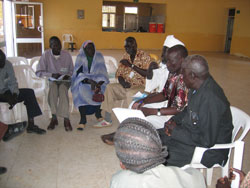The USIP Professional Training Program conducted a workshop in Malakal, southern Sudan December 5-7, 2005. Senior Program Officer Jacki Wilson was assisted by Program Officer Jonathan Morgenstein for the workshop, which was conducted in partnership with the NGO Reconcile.
The USIP Professional Training Program conducted a workshop in Malakal, southern Sudan December 5-7, 2005. Senior Program Officer Jacki Wilson was assisted by Program Officer Jonathan Morgenstein for the workshop, which was conducted in partnership with the NGO Reconcile. Participants included tribal elders and representatives from the Dinka, Nuer, Shilluk and other tribes, as well as religious leaders from both the Christian and Muslim community. Women and youth also participated. Special observers were present from PACT, UNMIS, and Upper Nile University.
This workshop continued the focus on regional dimensions of conflict that could undermine Sudan's Comprehensive Peace Agreement. Upper Nile was selected due in part to its links to the Wunlit Peace Agreement, a historically significant successful conflict resolution covenant among the Dinka, Nuer and Shilluk reached in 1999. Although the Wunlit agreement calmed fighting among these three major clans for many years, the potential for the resumption of violence is real, particularly as peace brings the stress of economic development, the return of refugees and IDPs, and DDR activities.
Participants contributed local conflicts or problems to help focus the discussions during the workshop. Following training on communications skills, negotiation skills, culture, and working with third parties, the participants were broken into working groups to discuss and to develop action plans. Topics discussed in the working groups included agriculturalist/pastoralist conflicts, tribalism and other local problems. The participants were eager to gain the skills and knowledge necessary to help them resolve their conflicts peacefully.



